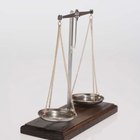
With a legal separation agreement, you set terms for child visitation, property division and child support even though you and your spouse remain married. If your spouse dies, separation can affect your inheritance rights and your responsibility for your spouse's debts. The exact rules depend on your state and its laws on married finances.
Inheritance Rights
When a spouse dies, the surviving spouse has an automatic claim on the deceased spouse's estate. If there's no will, that spouse is entitled to a percentage share. If there is a will, it can't cut out the surviving spouse completely or bequeath only a token amount like one buck.
Once you become legally separated, however, the rules change. In a majority of states, a legal separation ends your automatic claim on your spouse's estate. Seventeen states at time of writing follow the Uniform Probate Code, which says that without a divorce you retain the same rights every spouse has to a share of the estate. If you simply separate without any sort of court order, the law gives you marital rights to the estate similar to a nonseparated married couple.
Even if you have no rights, your separated spouse can still leave you something in the will, if he chooses. The law might also guarantee you other rights. Your spouse's 401(k) account will go to you unless you waive it. If you're named as beneficiary on other accounts, you probably stay the beneficiary if your spouse never got around to choosing someone new.
Death and Debt
Even without separation, you won't usually be required to pay any debts your spouse owed when she died. Her estate might have to pay the debts, which will cut into any inheritance you hoped for, but otherwise you should be safe. The big exception is any joint debts that have both your names as debtors. If you both signed the loan for your car, for instance, the lender can demand money from you, even if it was always your spouse who paid the bill.
In the small number of community property states, debts and assets your spouse acquired during the marriage are automatically half yours, and vice versa. Creditors can seize community property to pay for community debts. Any debts your spouse ran up after separation are usually hers alone.
After your spouse dies, debt collectors might contact you, claiming that you're legally obligated to pay a debt or that you have an ethical obligation. You have the legal right to tell them to stop contacting you or to tell them to talk to the estate executor instead. No matter what the collector threatens to do, talk to an attorney before settling any debts.
Related Articles

How to Find Out If I am the Heir to a ...

Spouse Responsibility for Medical Bills ...

How to File a Motion for Divorce if a ...

Virginia Laws About Legal Separation & ...

How to Divorce an Alcoholic Wife

How to File for a Marriage Separation ...

Types of Marital Status

California State's Statute on ...

How to Find Bank Accounts of Deceased ...

How to Cash Checks After a Wedding

How to File for Legal Separation in ...

A Checklist for Changing Your Name ...

Fastest Way to Legally Change Your Name

Telling a Roommate to Move Out

Can You Be Legally Separated and Live ...

How to Petition to Terminate the ...

The Advantages & Disadvantages of the ...

How to Change Your Name If Married in ...

How to Undo a Divorce

How Does a Marriage License Work?
References
- Legal Beagle: Does My Spouse Inherit Property if We Separate?
- 401k Help Center: What You Need to Know About Naming a Beneficiary for Your 401k
- Nolo: If You Don't Want to Leave Retirement Accounts to Your Spouse
- Nolo: Debt and Marriage
- Consumer Financial Protection Bureau: Can I Be Responsible to Pay Off the Debts of My Deceased Spouse?
Writer Bio
Over the course of his career, Fraser Sherman has reported on local governments, written about how to start a business and published four books of film reference. He lives in Durham NC with his awesome wife and two wonderful dogs.
Photo Credits
gavel image by Cora Reed from Fotolia.com